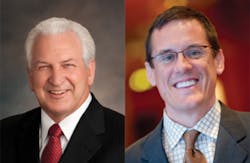Water Technology speaks with Bill Harp and Rick Stover
LATHAM, N.Y. — Fabbri Ag Services, an agricultural company based in Bakersfiled, Calif. with experience growing more than 30 commercial crops in the San Joaquin Valley, is starkly aware of the effects of long-term drought in California. And, effects could stretch beyond California, as the state is the number one food producer in the nation, growing nearly half of all U.S.-grown fruits, nuts and vegetables.
Desalitech, which provides resource and cost efficient industrial reverse osmosis systems and water treatment for industrial, agricultural and municipal applications, has provided a closed circuit desalination reverse osmosis system to a ranch owned and operated by Fabbri Ag Services. The ranch sits on top of a large, shallow aquifer that has become increasingly brackish with heavy usage and continuing drought. The desalination technology has allowed this aquifer to supply 300 gallons per minute of irrigation water to 40 acres of high value crops like almonds and grapes, effectively diversifying the farm's water sources.
Water Technology caught up with Harp and Stover to discuss the effects of water shortages in California today and how desalination technology can provide far-reaching solutions.
“The process operates at very high recovery rates, with a minimum amount of energy necessary and these systems are highly flexible in terms of the composition of the water coming into them and how they perform,” said Stover. “High recovery is important because if you are at an inland location like the Fabbri farm…you want to make the best possible use of the water you are taking out of the ground and you want to generate the minimum amount of concentrate waste."
Listen to the rest of our conversation with Harp and Stover on our podcast page, here: https://www.watertechonline.com/podcasts.
